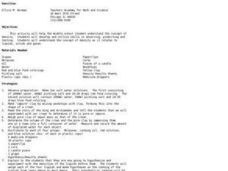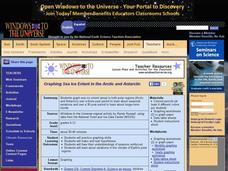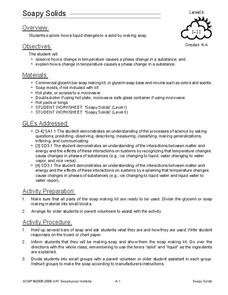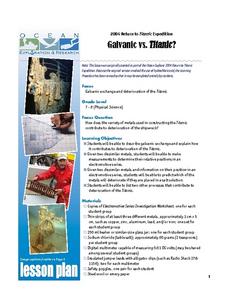Curated OER
Waterdrops
In this science learning exercise, students learn about water cycle, weather, clouds, storms and water resources by completing 8 pages of this full color newsletter. Students read a story, study weather maps, learn to make a rain gauge,...
Curated OER
Densities
Students explore the concept of density. In this density lesson plan, students determine the density of a crown and a sample of clay. They hypothesize about the densities of 4 liquids they are given including molasses, cooking oil, a red...
Curated OER
Huntington's Disease
Students research specific genetic disorders and create a pedigree of a fictitious local family in which Huntington's Disease is found. They predict inheritance and severity of HD and role play decision making process involving genetic...
Curated OER
Temperature Affects The Heart Rate
Students relate heart rate and development to environmental conditions through experiment. In cooperative groups, students record the heart rate in developing zebra fish. Groups create a standard curve to predict the temperature at...
Curated OER
An Underground River
Seventh graders describe how water flows through the ground, what an aquifer is and what soil properties are used to predict groundwater flow. They consider the affects of pollution on groundwater supplies and write a letter drawing...
Curated OER
Graphing Sea Ice Extent in the Arctic and Antarctic
Students graph sea ice data and predict long term trends in the data. In this climate change lesson, students use sea ice data from the Arctic and Antarctic to construct line graphs. They use their graphs to predict the effects of global...
Curated OER
Matter/Solid Liquid Gas Experiments
Students investigate matter:solid, liquid, gas by conducting different experiments. In this states of matter instructional activity, students conduct hands on activities that allow students to see first hand results. Students mix...
Curated OER
How Does a Green Plant Grow?
Students of all ages can explore the question "how do seeds grow?", design an experiment to answer the question, predict the outcome of the experiment then conduct the experiment.
Curated OER
Soapy Solids
Young scholars observe and explain how a change in temperature causes a physical change in a substance. In this physical science lesson plan, students use a soap making kit to observe the effects of adding heat to the bar soap as they...
Curated OER
Types of Marine Debris
Students conduct an experiment. In this marine debris and environment protection lesson, students categorize trash into piles, predict whether these trash items will sink, float or be picked up and carried by the wind and then test...
Curated OER
Galvanic vs. Titanic?
Students discover how galvanic exchange has contributed tot he deterioration of the Titanic. They perform an experiment in which they predict which of 2 metals deteriorate when placed in a salt solution.
Curated OER
Naming the Clouds
Fourth graders examine how water condenses into clouds and identify the different types of clouds using the same system devised over 200 years ago. They listen to a book about clouds, and create a Cloud Key. Next, they record their...
Curated OER
Changes In Matter, Not In Weight
Fifth graders investigate different objects and the examine the correlation of mass and weight. They conduct the experiment with the help of background information provided by the teacher and record observations before making...
Curated OER
Seasonal Cloud Cover Variations
Young scholars, in groups, access data from the NASA website Live Access Server regarding seasonal cloud coverage and the type of clouds that make up the coverage. They graph the data and make correlations between types, seasons and...
Curated OER
Performance-based Assessments for Semiconductor Circuit Competencies
In this electronics learning exercise, students predict the values of circuit components and compare this with the actual measured values. They solve 62 problems related to the circuits.
Curated OER
Ecology Community Status
In this ecology community status worksheet, learners research their state's ecosystem, make a chart of the biodiversity, analyze the chart and identify issues with wetland species. This page has several links to helpful web resources.

















